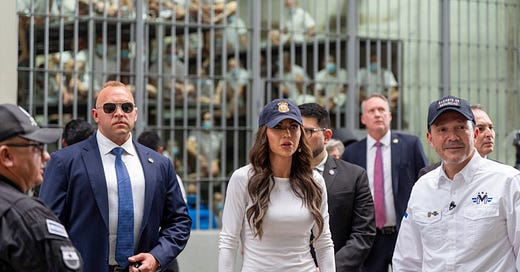
A Courtroom Recital of His Misdeeds ‘Rattled’ Trump
Don’t expect Trump to testify in his hush-money trial.

TODAY, TENS OF MILLIONS of Americans—not to mention a vast audience around the world—will follow the news coverage of the lawyers’ opening arguments in the first criminal trial of a former president of the United States, a reality made more disturbing by Donald J. Trump’s simultaneous status as the presumed Republican nominee for president in 2025. If convicted, Trump not only could be sentenced to prison, but he will be ineligible to vote in some states, including in Florida.
This morning, before the trial begins, New York Justice Juan Merchan will rule on whether—if Trump testifies in his own defense—prosecutors can introduce evidence of his prior misconduct and criminal acts to impeach his credibility (they can’t use it on its own to suggest he’s guilty of the 34 counts of falsification of business records that Manhattan D.A. Alvin Bragg charged him with through a grand jury). This exercise is called a “Sandoval hearing” under New York law, and it essentially tasks the judge with balancing the probative value of that information against the possibility that it could unfairly prejudice the defendant.
However Merchan rules, it’s worth underscoring which chapters in Trump’s past the government finds most relevant to his character—and how the judicial system has handled them, because in all likelihood, this trial will resolve in kind. Hearing in the courtroom on Friday this reminder that the hush money case is not his first joust with the justice system, Trump was reportedly left “rattled.”
The evidence of past behavior that prosecutors hope to cross-examine Trump with, if he testifies, includes the following (all quotes are taken from District Attorney Alvin Bragg’s Sandoval filing from last week):
The finding in the civil fraud case, by New York Justice Arthur Engoron, that “Defendant repeatedly and persistently falsified business records, conspired to falsify business records, issued false financial statements, conspired to issue false financial statements, and conspired to commit insurance fraud by fraudulently misstating the value of his assets for economic benefit.”
The finding by Justice Engoron in the same case that Trump “testified untruthfully under oath when he claimed that his public comments about a judge’s law clerk were instead about a witness.” Engoron specifically wrote that “as the trier of fact, I find [Trump’s] testimony rings hollow and untrue.”
The finding by Justice Engoron that Trump intentionally violated a court order by making public attacks on a judge’s law clerk “despite two prior court orders not to do so,” resulting in a $10,000 fine.
The finding by Justice Engoron that Trump violated a court order by failing to remove an “untrue, disparaging, and personally identifying post” about the judge’s law clerk from the website DonaldJTrump.com, resulting in a $5,000 fine.
The findings by juries that Trump “sexually abused” E. Jean Carroll and then made “false statements with actual malice” against her, resulting in a total award of $88,300,000 in damages.
A federal judge’s January 2023 finding that a defamation case brought by Trump against Hillary Clinton was frivolous and in bad faith, along with an order that Trump pay $937,989 in fees as a sanction. The court explained:
Here, we are confronted with a lawsuit that should never have been filed, which was completely frivolous, both factually and legally, and which was brought in bad faith for an improper purpose. Mr. Trump is a prolific and sophisticated litigant who is repeatedly using the courts to seek revenge on political adversaries. He is the mastermind of strategic abuse of the judicial process, and he cannot be seen as a litigant blindly following the advice of a lawyer. He knew full well the impact of his actions.
The December 2022 criminal conviction of the Trump Corporation on seventeen felony counts of fraud, conspiracy, criminal tax fraud, and falsifying business records involving a scheme to pay top executives off the books.
A November 2019 ruling by a New York judge that Trump “illegally allowed his 2016 presidential campaign to orchestrate a fundraiser for the Donald J. Trump Foundation” and use the funds to further his political campaign. The court ordered Trump to pay $2,000,000 for breach of fiduciary duty and waste, and Trump stipulated to dissolving the foundation to resolve additional claims of “failure to properly administer charitable assets, improper political activity, unlawful coordination with the Trump political campaign, and repeated and willful self-dealing transactions.”
Bear in mind that these are the things that the judicial system—either through judges, juries, or Trump’s stipulations—have already found Trump liable for. These aren’t unproven legal allegations or political spin. Although Bragg’s trial is probably the only criminal one that will move forward before November, it’s far from Trump’s first brush with the rule of law. It’s just that, in the maelstrom of chaos and corruption that defines Donald Trump, even the most diligent court watchers can easily forget how much the legal system has already caught up with him. And even Trump may have been surprised to hear it laid out all at once; it was apparently hearing this litany that resulted in him being “rattled” in court.
Trump’s lawyers argued against introduction of this evidence if he testifies; they reportedly said that sexual misconduct is too dissimilar from falsification of business records, that the civil fraud and Clinton rulings are both on appeal, and that the prior criminal conviction was of Trump’s company—not the man himself. For all Trump’s promises to “absolutely” testify, it’s highly unlikely that he will, given his track record of bluster and distortion, not to mention the inevitability that at least some of this information is going to come before the jury if he does. Trump’s defense team plans to argue that a key witness against him—his former lawyer and fixer, Michael Cohen, who allegedly concealed the $130,000 payoff to Stormy Daniels as legal fees when it was really to keep her quiet about her relationship with Trump and thus not hurt his chances in the 2016 election—cannot be trusted. (Cohen admitted to lying to Congress about Russian interference in the 2016 election, but has since explained it away as a symptom of his past, unflinching loyalty.) The government is evidently betting big that in a contest over who is the bigger liar, Trump or Cohen, the jury will choose the former president, and do so unanimously.
















